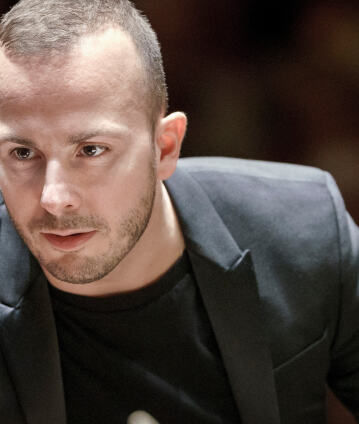Yannick Nézet-Séguin conducts Brahms’s “Ein deutsches Requiem”

Brahms’s Ein deutsches Requiem is a powerful, solemn work, yet its message shows the utmost compassion. While the horrors of the last judgement are the focus in traditional requiem settings, Brahms’s work sings sensitively of sorrow and consolation in the face of death. The conductor of this performance is Yannick Nézet-Séguin, music director of the Philadelphia Orchestra and music director designate of the Met in New York.
“I am completely satisfied with your Requiem,” wrote Clara Schumann enthusiastically to Johannes Brahms, who juxtaposed the tragedy of human mortality with the comfort and hope of eternal life in the work. “It is a very powerful piece, and grips the whole person in a way that little else does. The deep seriousness, together with all the magic of poetry has a wonderful, harrowing and soothing effect.” With his German Requiem, Brahms had not created ecclesiastical liturgical music in the classical sense. Rather, the work is a choral cantata based on freely chosen excerpts from the Lutheran Bible which revolve around the basic dualism of life and death, mourning and comfort, transience and transfiguration. There are no intercessions, which are otherwise prominently represented in the Catholic Latin text. Brahms also omits any mention of the redemption of Christ, which is central to the two denominations – something which caused problems at the time: “My Requiem is sung in Bremen every year. But since the name Christ does not occur in it, permission to use the Church is granted only on condition that this deficiency is remedied by a financial contribution.” Textually and musically, each of the seven movements ultimately makes clear just what it is that makes the comforting overall character of this interdenominational requiem: “Death, where is thy sting? O grave, where is thy victory?”
Yannick Nézet-Séguin, future successor to James Levine at the Metropolitan Opera in New York, now conducts Brahms’s Deutsches Requiem in the Berlin Philharmonie. In addition to the orchestra, the performers include the Rundfunkchor Berlin, rehearsed by its chief conductor Gijs Leenaars. The soprano soloist is Hanna-Elisabeth Müller who recently made her debut at the Met. At her side is Wiebke Lehmkuhl who debuted at the Vienna Musikverein and the Lucerne Festival in 2011, and made her first guest appearance at the Salzburg Festival one year after. The demanding baritone role is taken by the Austrian singer Markus Werba.
The concert opens with Carl Philipp Emanuel Bach’s motet “Heilig ist Gott”, composed in 1776 – a ceremonial theophany for contralto, double choir and orchestra, which occasioned the Bach son to employ the full range of tonality at his disposal. Despite its masterful design, the music conveys an impression of the greatest simplicity: “This ʻHeiligʼ,” according to the composer, “is an attempt to attract far greater attention and sensation through ordinary harmonic progressions than any anguished chromaticism is able to achieve. It is my swan song, and should serve to ensure that after my death I am not too soon forgotten.”
© 2017 Berlin Phil Media GmbH
Related interviews
Artists
Our recommendations
- Claudio Abbado conducts Schubert, Debussy and Mahler
- Christian Thielemann conducts a concert “à la française”
- Bach’s “St Matthew Passion” with Simon Rattle and Peter Sellars
- Claudio Abbado conducts an “Italian Night” at the Waldbühne
- Simon Rattle conducts Beethoven and Mendelssohn at the Waldbühne
- Simon Rattle conducts Mahler’s Second Symphony